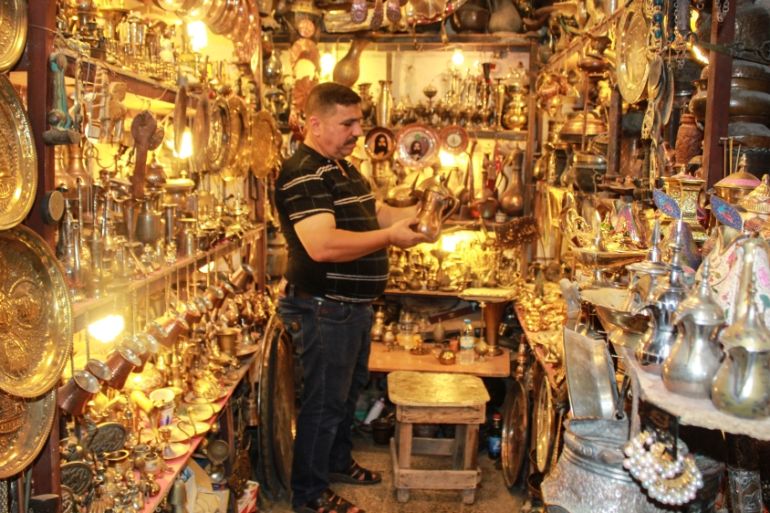Baghdad’s coppersmith souk: A fading cultural treasure
Like much of Iraq’s cultural heritage, years of war and neglect threaten Baghdad’s ancient coppersmiths’ marketplace.

Baghdad, Iraq -The cheerful sound of hammers tapping on copper once rang loud and clear down Souk al-Safafeer, Baghdad’s ancient coppersmiths’ market.
Fifteen years ago, the half-kilometre-long marketplace was bustling with vendors selling handmade copperwork off their packed shelves, while apprentices stoked the fires and beat out sheets of raw copper, shaping the glowing metal into ornate pieces for sale.
Today, the sound of hammers on copper has nearly fallen silent. This once-lively bazaar, open since the Abbasid era, has transformed into a dispirited fabric market.
The few coppersmiths who remain complain of financial strains and a lack of demand. Tourism came to a near halt after the 2003 US-led invasion of Iraq and a weakened economy left locals unable to afford these products.
![This once lively bazaar has transformed into stalls for fabrics [Rayhan al-Mosully/Al Jazeera]](/wp-content/uploads/2018/08/1001ec5384804717a27bdbdbe3699f82_18.jpeg)
“Before the war [2003 US-led invasion] everyone was beating [on copper],” says Mohamed Mahdi, a 52-year-old coppersmith at Souk al-Safafeer.
Government officials bemoan the disappearance of the Iraqi capital’s heritage as the country comes out of years of war and destruction. But with limited funds, they say there is little they can do to revive it.
Fading identity
“We used to be 68 coppersmiths here. Now it’s only 10 of us, and only a handful actually beat the copper into shape,” says Mahdi, lowering his eyes.
Apart from religious tourism, foreign tourists – the usual buyers of handmade products at the souk – have nearly disappeared since 2003.
![Souk al-Safafeer is about 500 metres long [Rayhan al-Mosully/Al Jazeera]](/wp-content/uploads/2018/08/5e1f94b54d5946e0add2e8a12a299f2a_18.jpeg)
Mahdi, who inherited the 80-year-old shop from his grandfather, says dwindling demand makes it a struggle to carry on.
“The flow of work is weak and so is our profit. We depended on tourism and now that it has disappeared, we have no buyers,” he told Al Jazeera.
He said Iraqis, who earn $400 a month on average, cannot afford his products and turn instead to cheaper Chinese and Indian alternatives that have flooded the market.
Expensive rents and ever-increasing electricity bills caused by power shortages make running a business even more costly.
This has led many coppersmiths to leave the industry and sell their shops to fabric store owners, who have taken over the marketplace over the years.
![Assad Baldawi, 44, moved into the old market in 2003 and now owns two fabric stalls [Arwa Ibrahim/Al Jazeera]](/wp-content/uploads/2018/08/d48646ac2cd241e99871ed893501b096_18.jpeg)
One of these not-so-newcomers is Assad Baldawi, a 44-year-old fabric stall owner who moved into the market in 2003, the time when the market began to drastically transform.
“After the US invasion, 90 percent of the market became fabric stalls within a few years,” he says recalling how the souk once had a strong traditional identity in the 1980s.
Baldawi, who now has two fabric shops in the market, says that, unlike the coppersmiths, his business is doing well.
“There’s always demand for fabric. Every year we look around and another coppersmith shop has closed down and become a fabric stall.
“This place will eventually lose the identity of what it once was,” he adds.
‘No money, no heritage’
According to Mazen Razouki, head of the tourism and heritage committee at the Baghdad provincial council, Iraq’s local and central government have been overwhelmed by more urgent issues of fighting corruption, reconstructing destroyed provinces and security issues.
![Officials say there is nearly no budget to protect traditional crafts [Arwa Ibrahim/Al Jazeera]](/wp-content/uploads/2018/08/a021623f34534c959705efe4f1af2473_18.jpeg)
“The government has enough to deal with. Handicrafts and tourism are quite unimportant at the moment and their continuation is linked to demand.
“If demand is low, then so will production be,” he says, adding that there is a nearly zero budget dedicated to protecting and maintaining traditional arts and skills such as making copper wares.
“Even when it comes to protecting Iraq’s history, we have much bigger problems to address: the heritage sites that have been looted and destroyed,” he says.
In 2014, the Islamic State of Iraq and the Levant (ISIL, also known as ISIS) armed group looted and destroyed several archaeological and historic sites across northern Iraq, including centuries-old mosques and tombs in Mosul’s old city and Assyrian towns in Nineveh.
“If we have the money to dedicate to Iraqi heritage, we would start by securing and maintaining those sites instead.”
Despite the uncertain outlook and condition of Souk al-Safafeer, Mahdi says he will never leave his shop or give up copper work.
“I’ve been offered attractive deals to sell this shop, but I’ll never leave my grandfather’s trade behind,” he says.
“Beating this copper and listening to its sound ring through my ears and runs through my blood. It’s what keeps me alive.”
Follow Arwa Ibrahim on Twitter: @arwaIb